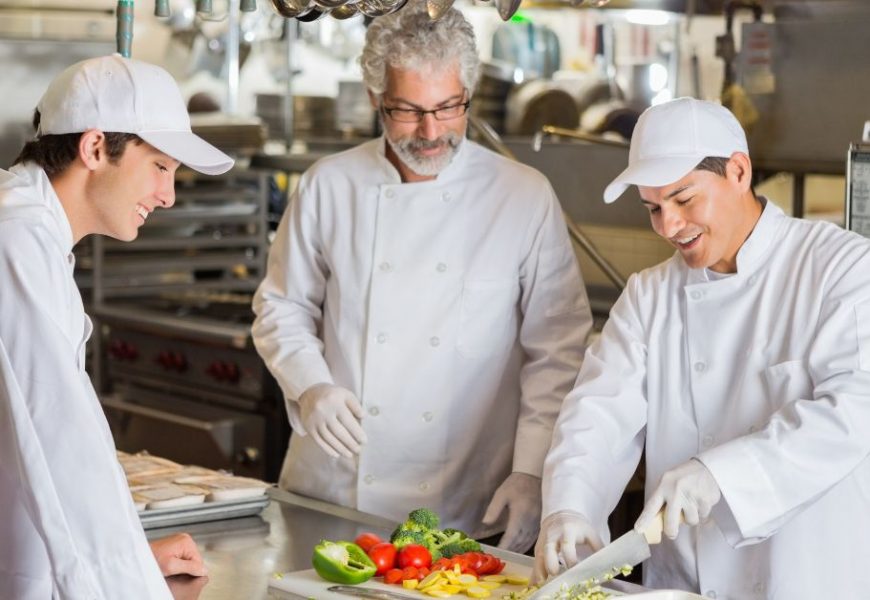Careers in the culinary industry bring a strong sense of creativity, passion, and techniques. This booming field offers various roles, from bakers and cooks to food stylists and restaurant managers. As the need for culinary experts continues to increase, opportunities show up for individuals excited to explore this realm.
In this article, we will learn about the exciting jobs in the cooking industry, like culinary chefs, pastry artists, and more. If you are a cooking enthusiast and want to explore the various careers in the food industry, you are in the correct place to uncover the pathway to success!
Table of Contents:
- Why Choose a Career in Culinary Arts?
- Educational Pathways in Culinary Arts
- Importance of Formal Education vs. Hands-On Experience
- Key Skills Needed for Success in the Culinary Industry
- Specializations in the Culinary Arts
- Career Growth and Opportunities in the Culinary Industry
- Tips for Breaking into the Culinary Industry
- Job Hunting Tips for Culinary Professionals
- Conclusion
Why Choose a Career in Culinary Arts?
The culinary industry brings a wide range of opportunities for individuals excited about food and cooking. From working in high-end restaurants and providing services to starting your own food truck or becoming a food stylist, the options are endless. As the food sector grows and evolves, so do its roles, including areas like nutrition, culinary education, and food technology. This allows upcoming chefs and culinary professionals to build their own distinct paths, allowing them to make it an attractive field for those looking to make their spot.
Working towards a career in the food industry gives various benefits, especially the chance to express artistry through food. To turn the culinary vision into reality, culinary professionals can experiment with presentations, flavors, and techniques. Moreover, a career in this industry usually starts from a real passion for food, enabling individuals to work in a setting they love. With the increasing demand for skilled culinary professionals, job growth in this field is promising, offering potential advancement and stability.
Educational Pathways in Culinary Arts
The culinary arts sector brings various different educational pathways to equip individuals with important skills and knowledge. Whether your goal is to get a fast entry into the workforce or in-depth education, there is always an option to align with your career goals.
Different Types of Culinary Education
Here are the primary educational pathways in culinary arts:
- Certificate Programs: These courses usually last a few months to a year and concentrate on a particular skill. They offer practical learning in fields like culinary fundamentals, baking, and international cuisine, helping students gain hands-on knowledge quickly.
- Diploma in Culinary Arts: These programs usually last for one to two years and provide an in-depth knowledge of the subject. Students learn important cooking methods, like kitchen management and food safety, equipping them for roles like kitchen manager or cooks with a strong base in culinary practices.
- Bachelor’s Degrees: These degree programs usually last for about four years and offer advanced culinary education fused with food service management and business fundamentals. Graduates are ready for senior-level jobs, like restaurant managers or executive chefs, combining managerial skills with culinary mastery.
Each pathway offers crucial training and equips students for a lucrative career in the culinary industry.
Importance of Formal Education vs. Hands-On Experience
In the world of culinary, formal and practical both experiences play a crucial role. Foundational knowledge, technical skills, and certification can all be achieved with a structured culinary education that builds trust and prepares chefs for various career paths. However, hands-on experiences give practical skills, adaptability, and artistry in real kitchen environments, which are important for growing in this dynamic culinary space.
Skills Taught During a Culinary Education
- Cooking Techniques: Students are taught crucial learning techniques like sauteing, grilling, baking, and poaching, creating a foundation for various different cuisines.
- Food Safety and Sanitation: Make sure to be dedicated to hygiene standards, important for avoiding foodborne illnesses and preserving a secure kitchen environment.
- Knife Skills: Proficiency in handling knives enhances precision, safety, and speed in the kitchen, enabling chefs to work effectively.
- Nutrition Basics: Understanding the principles of nutrition helps in creating balanced healthy dishes satisfying the needs of health enthusiasts and diners.
- Plating and Presentation: Educates about the art of beautifully presenting food, improving aesthetic appeal, and enhancing the dining experience altogether.
- Menu Planning: Builds skills to design a variety of menus that strike a balance between the taste, dietary needs, and cost while attending to various customers.
- Inventory and Cost Control: Provides an understanding of managing supplies and keeping expenses under check, crucial for successful kitchen operations.
- Baking and Pastry Arts: Mastery in making bread, desserts, and pastries, giving a chef’s skills more depth.
Key Skills Needed for Success in the Culinary Industry
In the culinary space, to be successful you need to have a good command of technical skills as well as soft skills, both of which show the chef’s adaptability and efficiency in the kitchen. Here’s a closer look at the skills that set culinary professionals apart:
Technical Skills: The efficiency of technical skills like baking, knife skills, grilling, and sauteing is crucial for accuracy and effectiveness in food preparation. These skills are the cornerstone of daily tasks, allowing chefs to make high-quality dishes regularly and take care of various cooking methods with ease.
Soft Skills: Soft skills like good communication, time management, and creativity improve a chef’s skills to work effectively with the kitchen teams, experiment with the ingredients, and manage time efficiently. These skills are important in high-pressure kitchen settings, where partnering and calling decisions are important for a seamless workflow and the best culinary results.
Specializations in the Culinary Arts
Let’s explore some specializations in culinary arts:
- Chef
- Food Stylist and Photographer.
- Culinary Instructor.
- Restaurant Manager or Owner.
- Catering and Event Planning.
Chefs: Chefs are the innovative, creative, and managerial leaders in the kitchen, building recipes and supervising the execution. They oversee kitchen staff, manage food costs, and control inventory, needing solid skills in communications, decision-making, and leadership. Usually, chefs progress from cook roles, slowly moving up to executive chef or sous chef positions. Salaries depend based on specialization:
- Executive Chef: ₹8-15 lakh per annum
- Sous Chef: ₹4-7 lakh per annum
- Pastry Chef: ₹3.5-6 lakh per annum
Food Stylist and Photographer: Food stylists work towards making the food look aesthetic and appealing for TV, advertisements, and cookbooks. This job role needs mastery of food aesthetics, and a keen eye for detail. Food stylists work closely with photographers making teamwork important. While culinary skills are beneficial, food stylists usually gain hands-on experience through internships, eventually growing into independent projects as they gain skills and a name for themselves.
- Food Stylist: ₹8–12 lakhs per annum
- Food Photographer: ₹10–15 lakhs per annum
Culinary Instructor: The responsibility of a culinary instructor is to train and teach upcoming chefs and culinary students about food safety, cooking methods, and kitchen management. Instructors usually work at community colleges, culinary schools, or in private cooking tutorials. They require solid communication and teaching skills, along with in-depth understanding of culinary arts and the skills to break down intricate techniques into easy-to-understand lessons.
- Salary: ₹8–10 lakhs per annum
Restaurant Manager or Owner: Several people want to start their own restaurant, a role that needs culinary skills and business sharpness. Restaurant managers or owners usually supervise staff, control operations, and take on strategic projects like menu planning, marketing, and budgeting. For people with a culinary background, this role can be a lucrative way to fuse a passion for food with leadership quality.
- Salary: Depends on restaurant success.
Catering and Event Planning: Catering and event planning experts manage food services for events like corporate functions and weddings. They take care of menu selection, staffing, logistics, and setup, needing solid organizational and communicational skills to understand client needs effectively.
- Salary: ₹7–10 lakhs per annum
Career Growth and Opportunities in the Culinary Industry.
The dynamic industry of culinary offers a variety of careers in the food industry and advancing opportunities globally. Major culinary hubs involve countries like Italy, France, the United States, and Japan, each famous for their outstanding culinary traditions and growing restaurant scenes. Regions like New York, California, and London also provide various opportunities, drawing chefs and culinary professionals from around the world.
Upcoming markets, like India and China, are seeing an increase in culinary innovation, leading to an increase in demand for expert chefs and skilled culinary professionals. As the interest in cuisine continues to grow globally, professionals can find amazing cooking career paths, whether in upscale dining establishments, food entrepreneurship, or catering services.
Tips for Breaking into the Culinary Industry
To gain practical experience and industry expertise, think about applying for internships or apprenticeships at dining establishments or catering businesses. Your experience can also be improved by volunteering at neighborhood gatherings or culinary contests.
Creating a portfolio that showcases your culinary skills, complete with dish photographs and method details, will significantly boost your chances of securing a job. Keeping a record of your training and finished projects gives prospective employers a concrete picture of your abilities and inventiveness.
Job Hunting Tips for Culinary Professionals
When you apply for culinary job roles, craft a culinary-focused resume that showcases culinary-related skills, education, and experiences. Include a cover letter that highlights your passion for the industry.
Use social media and online platforms to show your culinary skills, uploading pictures, videos, and recipes to establish a personal brand. Interacting with culinary communities online can also open networking possibilities and assist you in staying updated on culinary career opportunities in the industry.
Conclusion
In summary, careers in the culinary industry offer a wealth of opportunities for those passionate about food and cooking. With various jobs in the food industry ranging from chefs and food stylists to restaurant managers and culinary instructors, the potential for growth and creativity is immense. Whether you are interested in high-end dining, catering, or culinary education, there are numerous jobs in the cooking industry that cater to diverse interests and skills. As the culinary landscape continues to evolve, now is the perfect time to explore these exciting career paths and turn your culinary dreams into reality.
(Visited 239 times, 1 visits today)
Popular Search
Top 10 DJ India
Makeup Steps
Advantages of Makeup
Interior Designer Salary
Makeup Artist Course
Benefits Of Photography
Hospital Waste Management
Types of Fashion Designing
Types of Lenses in Photography
How to Become a Radio Jockey
Best Nutrition Courses in India
Importance of Media Management
How To Become a Dietitian in India
Importance of Nutrition in Health
Interior Design History and Origins
Top 10 Famous Interior Designers
Top 10 Music Labels in India
Top 10 Best Animation Studios in India
Top 10 Nutraceutical Companies in India
Top 10 Fashion Designers in the World
How To Write a TV Commercial Script
Top 10 Career Opportunities in Fashion Designing
Advantages and Disadvantages of Animation



















